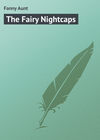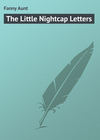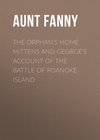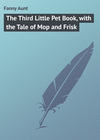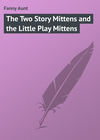Loe raamatut: «More Mittens; with The Doll's Wedding and Other Stories», lehekülg 3
In the gray dawn of the morning he came back to Yonkers, where the remains of the still burning steamer lay, and hastened once more to the beach. Preparing once more to dive into the river again, a simple object – a child's bonnet met his eye, floating on the water. It was Maggie's bonnet. His heart stood still; his blood froze in his veins; his eyes strained wildly after the little token of his dreadful loss, as it floated idly by, its wet and stained blue ribbons fluttering in the summer breeze. He neither spoke nor stirred; he seemed turned into stone; his hands clasped tightly together, and his gaze fastened upon that tiny, but terrible sign of the hapless fate of his wife and child. The pitying bystanders tried to arouse and draw him away. They assured him that it was useless to attempt finding any more bodies – every possible effort had been made; and, at length, the heart-broken man went sadly away to return to his desolated home.
When he arrived in the street where he lived, and drew near the familiar house, a shudder came over him. Little Maggie had always watched for him at the door, to spring into his arms and receive "the first kiss." With a keen pang at his heart and a smothered groan, he murmured, "They are gone – they are dead. Oh, I cannot go there! I shall be mad if I do."
But suddenly One stood by his side invisible to mortal eyes, and there came into his heart, like a soft, sweet strain of heavenly music, these words, "Blessed are they that mourn, for they shall be comforted."
Great tears came to his relief, and softened the fierce pain at his heart; and now, with deep-drawn sighs, he entered first a neighbor's house to seek that sympathy which his sorely stricken soul had before refused, and which would give him strength to enter the home where they were not.
His friends met him with extended hands and glad voices, exclaiming, "Oh, how glad we are that you have come! We rejoice with you that your dear ones are safe."
"Safe – SAFE?" he cried, "do you mock me in my misery?"
"Why," they answered, "do you not know that they have returned, and are safe in your house?"
With a cry that rent the air, Maggie's father rushed out of the door and into his own house, and in a moment his wife and his dear little child were clasped tight in his arms – his shrieks of hysterical laughter, mingled with the great sobs that convulsed his frame, showing, too plainly, alas! that joy had finished what grief began; for now he had indeed lost his senses. The sudden revulsion had been too much; but, after a while, the gentle soothings of his wife and the loving caresses of Maggie restored him to himself; and soon he was ready to listen to the wonderful account of their escape – many times interrupting the narrative to fold his little Maggie, with tears, to his breast, and to thank God again and again for the blessing of such a child.
And now, dear little reader, Maggie has grown up to be a young lady. She has the same dark, thoughtful eyes and transparent purity of complexion. She flits about her father's house like a sunbeam, bringing joy and delight into his heart, and her voice issues from her beautiful mouth so sweet and clear that it seems like the singing of a lark. With the thrilling memory of the past ever before him, her father oftentimes gazes into her sweet young face with an earnest tenderness impossible to describe.
I wish every girl and boy that will read this could have known Maggie when she was a child; they would have wondered how such a delicate little creature could have shown so much courage and endurance. It seems incredible, and yet every word I have written is true.
I also wish that I could tell them her whole name; but I promised, when permission was given me to write this account of heroism, I would not tell her name, or even where she lived. But I will tell this much: She lives, at this very moment, on a beautiful island, very near the city of New York; and she is so modest and retiring that her very next-door neighbor does not suspect he is living close to THE CHILD HEROINE!
AUNT MARY
A SKETCH BY A GIRL OF FIFTEEN
It is my opinion, that in spite of my being quite a simple young girl, I might, without exciting much surprise, personate the character of a respectable old lady; for all kinds of antiquities seem to agree extremely well with me.
Thus, an old book has a peculiar charm for me; an old dress always sets better than a new one; and, certainly, every one will allow, that there is no comfort in the world equal to a pair of old slippers.
But most particularly am I fond of old ladies and gentlemen, with their quaint stories of the days when they were young; those magical days, when the sun shone quite differently from now – "so much longer and brighter;" the soft summer breezes were sweeter and cooler, and the winter snows were not the six-inch-deep affairs, we have at present, but were up to the second-story windows; then the birds sang far more sweetly than they ever do now-a-days: the peaches were twice as large, the apples three times, and the gentlemen bowed four times lower, and twenty times more respectfully.
The dearest of all my elderly relatives, is my mother's aunt – my Great-aunt Mary. I wish you could see her sitting in a corner of the fireplace, in a funny little black rocking-chair of hers, that is, no one knows how old, with a mosaic patch-work cover on the back, always busy with her knitting or sewing, and just the dearest, sweetest little old soul in the world; though she is my great aunt, I am so much larger and stronger, that I could, if I pleased, catch her up in my arms, and run all over the house with her, without her being able to help herself. I mean to try it, sometime.
Aunt Mary's face is wrinkled, but her blue eyes are still clear and bright – her soft gray hair is parted over a placid brow, her smile is very sweet, and her voice so pleasant and kindly, that you feel as though you could never do enough for her, and you love her instinctively, the very first time you see her. I believe that is the reason everybody calls her "Aunt Mary;" it seems as if they could not help it, but I think it a great liberty.
Aunt Mary is not one of those old old ladies, who think little folks should sit upright on a hard wooden bench, with nothing to rest their poor little tired spines against, and nothing to do but stare at the fire, and twirl their thumbs.
She took a great-nephew of hers to church, not long ago, a little bit of a fellow, and, I think, a perfect darling. Stanny had never been to church before, and he was so surprised with the great painted windows, and the quantity of people, that he sat up, in wondering silence, as grave as a judge; and Aunt Mary was just thinking, to herself, "How well Stanny behaves! really, I am quite proud of him," – when, suddenly, the organ struck up very loud, and Stanny, well remembering the organs in the street, which he always ran to the window to see, shouted out loud: "Why, Aunt Mary! there is an organ! but where is the monkey?" Of course, everybody round laughed; how could they help it? and dear old Aunt Mary, instead of wanting to shake his head off – as some old ladies would – laughed, too, but whispered to him to speak more softly next time, and gave him a gum-drop out of her pocket.
She loves all the children, and is the soul of indulgence to all her little nephews and nieces, and don't scold a bit when they run away with her snuff-box, as Fanny and I have often done; although she is naturally very quick-tempered, her patience and forbearance are beautiful to observe.
Aunt Mary never uses spectacles; she reads the finest print, and stitches far more neatly than I can, without them; and those faded but small and pretty hands, have knit more stockings for the poor, and made more patch-work bed-quilts, than I have time to count.
Then she is very lively, and has often made me shout with laughter; her comical expressions, with many a quiet sly cut at our faults and nonsensical notions, and her funny stories, are far better than the writings of many an author, who tries to write as though his fun was not the hardest work in the world for him, instead of coming right from his heart, like my dear Aunt Mary's. Time has not soured her, as it does some old people; you never see her going about, with her brows tied up in – oh! such a hard knot – with a querulous moan of: "W-h-e-r-e-'s my spectacles? why d-o-n-'t you come and light my fire? who's got my snuff-box? oh, dear!" Not at all! but it is: "Do let me read you this in the paper" – a noble act of heroism, or a funny anecdote, that has excited her admiration, or laughter; and, presently, we will all be admiring, or laughing with her, to her immense satisfaction.
You can't get Aunt Mary to put on a hoop petticoat, or wear gaiter boots. She remains steadfastly by her narrow skirts and prunella shoes.
Once, as a very great favor, she permitted me to try on a dress of hers, which she wore to her first ball, when she was about sixteen years old. You may imagine what a singular figure I made in it, when I tell you that there were but two breadths in the skirt, and tiny gores at the side; while the sleeves stood out, as though they were lined with buckram, and the waistband came just under my arms. The material was the thickest of white silk, with lovely bunches of roses all over it. You perceive that fashions have changed considerably since she was a girl; and, I often think, how queer it must seem, for her to look back on all the fashions that have come up since her first ball dress.
And now, I will tell you something very interesting, indeed, about Aunt Mary. She has seen the great General Washington, alive; and I would be willing to be just as old, if I could say the same.
Yes, my dear old aunt is of another and past century. It always seems to me, as though she should be dressed with the powder, high-heeled shoes, and ruffles of real lace that she wore long ago.
But in any dress we shall always love her dearly; for she is to us a kind monitor, a sincere friend, and a simple, earnest Christian. God bless dear Aunt Mary.
LITTLE PETER
Of all the funny little fellows that I ever knew, little Peter, at six years of age, was the quaintest and funniest.
Now, as this, like all the rest of my stories, is a "real true" story, I dare say you would like to know who Peter was, and where he lived – and, as I did not promise to keep it a secret, I will tell you. In the very first place, it will give you the most delightful feeling of interest in the world, and convince you that he was, or ought to have been, the happiest child possible, when you read that he lived on a beautiful island, very near New York, and in a beautiful place that was called "Clear Comfort."
You may be sure that "Clear Comfort" was not one of those grand, gloomy places, with forty cross old gardeners trotting about continually, and scratching at the walks with their rakes, and counting every flower in the beds, so that, if you happened to pick a lady's ear-drop, or a lady's slipper, or a white lily, or a red rose, as Peter often did, they would find it out immediately, and be ready to cut your head off. Not at all.
With occasional assistance for the rough work, Peter's mother was the gardener in this charming spot, and it really seemed as if the flowers loved her as much as she loved them, and grew up, under her beautiful hands and dainty care, in such profusion and splendor, as the cross old gardeners in the neighboring places would have given all their eyes and elbows to have beaten; but, unfortunately, they did not happen to have the winsome, coaxing ways, and sweet smile of Peter's mother; and I suppose the flowers knew it, and that was the reason why every thing in her garden was nine times handsomer than anywhere else.
The house Peter lived in was a long, low, one storied cottage, with dormer windows peeping up here and there, and every one of them in summer had an ornamental frame clinging around it, of scarlet-runners or some other beautiful vine. One night, one of Peter's sisters chanced to look through one of these windows as an artist was passing, and he declared that the maiden with her fair hair, and the blended roses of her cheek, in the frame of delicate leaves and flowers, so graceful and appropriate, were far more lovely and picturesque than any gold-bedecked portrait he had seen in the Academy of Design.
All the rooms in this delightful cottage were exactly the right size, for you could have as many people in them at once as was just agreeable. Every room was filled with handsome, comfortable furniture, and the most beautiful things imaginable, besides; not such fine things as Mr. Marcotte, the French cabinet-maker, invents. Oh, no! they were far more wonderful and admirable; for there, in one corner, you would come upon a tiny bird's nest, the marvellous construction of which would fill you with admiration for the cunning little architect. Even Mr. Renwick, who built Grace Church and the Smithsonian Institute, could never make one like it if he tried all his life.
In another corner would be a few cotton bolls of sea-island cotton, the soft, snowy mass bursting from within, a perfect marvel to behold. Then Peter's father and sister would take long walks in the woods, and bring from thence great bunches of strange and splendid ferns, and wild flowers, growing unseen and unregarded, save by such refined and ardent admirers of Nature.
His elder sister sketched beautifully, and painted in water colors, and the walls were adorned with lovely little "bits" of landscape, so correctly drawn and softly tinted, that the eye delighted to rest upon them, and, altogether, "Clear Comfort" was just such a house as Washington Irving, N. P. Willis, Curtis, or any person of great taste and refinement would be enchanted to live in.
The waters of the Narrows streamed past the windows; opposite, were the lovely shores of Long Island, and beyond, the wide Atlantic Ocean. Every steamship and other vessel passed by so close, that if you waved your handkerchief, passengers were sure to return the politeness. Peter once waved a large cat at the Persia, as she went by in her stately grandeur, with flags flying in the sweet summer wind, and some one on board, seeing and enjoying the joke, held up a pig by the ears by way of return, and Peter ran into the house laughing, and declared to his sister that he heard it "creek," by which queer word, he meant "squeak."
One morning Peter jumped out of his little crib, which was close to his mother's bed, and felt in such excellent spirits, that he turned to his mother, and cried, "Do wake up, mamma! wake up, papa! it is so pleasant! I could jump out of the window with joy. I will, too!" and before his mother could spring from the bed to prevent him, Peter had scrambled out of the window, and was running along the eaves, his one little garment fluttering behind him in the soft summer breeze. He came presently to the window of his sister Minnie's room, and, as it was open, jumped in, and commenced dancing about and turning somersets in a perfect ecstasy of delight, exclaiming, "I am so happy! I am so happy! I don't know what to do! I wish I could sit up the whole time, and never go to bed any more, or have to spell long words, or learn that stupid multi-something-cation table; but just eat lumps of sugar, and play the whole time."
"Why, Peter!" said Minnie, who was now awake, and laughing at his comical antics, "I don't think it very likely you will ever die of learning. What are you going to do when you grow up, if you don't learn, while you are young, to read, write, and cipher?"
"Oh, there will always be plenty of people to read to me, just as there are now. I mean to hire two big girls to do nothing else but to read to me; when one is tired, the other shall begin. Just look at my little white mouse, Minnie: I dare say it is nothing but hard work, and that dreadful studying, that has turned his hair white! I mean to take care of my health, my dear," and the queer little fellow shook his head at her in a solemn fashion, looking at least fifty, and then scampered off to his mother's room to be dressed.
While the dressing was going on, Peter saw a spider, and exclaimed, "Only look, mamma! at that great daddy long-legs staring in at the window! I should think his legs were about two miles long. And, see! he has four tails sticking out behind!"
"Two inches would be nearer, Peter," answered his mother, "and his tails are all legs. I expect he is looking in to invite some poor little lady-fly into his parlor, and when he has her there, he will pounce upon his company and eat her up."
"The hateful thing!" exclaimed Peter; "I'll just tie a string to one of his legs, and throw him into the water. I've a first-rate string in my pocket. But here! what's the matter? what ails my pantaloons? where's my pockets?" he continued, looking down in dismay at the strange, baggy appearance of the garment.
The truth is, Peter's mother had been so busy looking at the spider, that she had put on and buttoned his pantaloons the wrong side before.
Peter went on saying, "Why, mother, what's a fellow to do? How am I to get my hands in my pockets?" He twisted his head over his shoulders till he made a terrible kink in his neck, and turned his arms nearly out of their sockets in his efforts to dive into his pockets; and there came over his childish face such a ridiculously solemn and tragical air, that his mother nearly died of laughter.
When she could speak she said, "You must excuse me, Peter, it was an accident. It is very fortunate your head don't come off. If I had buttoned that the wrong side before, you would have been worse off than a crab; they walk sideways, but you would have had to have walked backwards."
In a few moments the pantaloons were danced off, and put on again; this time "all right and tight," as Peter said. Then his mother washed his face and hands, till they perfectly shone, they were so bright and clean; and, at his earnest request, she brushed his hair very carefully, with a seam down behind, and a flourishing curl on top, "like the dandies."
And now the little boy's face assumed a serious, thoughtful expression, as, kneeling by the side of his good mamma, he repeated this little prayer: —
"Ere from my room I wend my way,
God grant me grace my prayers to say:
O God! preserve my mother dear,
In strength and health, for many a year;
And O! preserve my father, too,
And may I pay him reverence due;
And may I my best thoughts employ,
To be my parents' hope and joy:
And O! preserve my sisters dear,
From every hurtful influence here:
And may we always love each other,
Our sisters, father, and our mother;
And still, O Lord, to me impart
An innocent and grateful heart,
That, after my last sleep, I may
Awake to thy eternal day."1
After saying this beautiful prayer he ran down stairs, and out into the sweet, fresh air, and had a glorious scamper, which gave him a famous appetite for his breakfast.
I am obliged to tell you that my little friend Peter was as full of mischief as an egg is full of meat, and he always went so seriously to work, with such a grave twinkle in his bright, blue eyes, that you could not help laughing if you were ever so angry.
One morning he was alone in the parlor, sitting in his little arm-chair; a pair of old spectacles, which he had picked up somewhere, perched on the end of his little nose, and one leg nursed up on the other, "just like grandpa," as he said. He was pretending to read the newspaper.
Presently he rose up, stretched his little legs, (and very fine legs they were,) the stockings upon which were tightly gartered above the knee, and pushing the spectacles up on the top of his forehead, as he had seen his grandfather do, he said to himself, "Dear me! very little news in the paper to-day! Only the quarantine burned down. I wish I had been there! What fun! to run all round with my little pail full of water, and help to put it out! I wish they would set something else on fire in the day time, and give a man a chance to see it! I wonder what I shall do next?" and Peter approached the window and looked out.
It was a still, lovely day; the sun sailed slowly up in the heavens, and the blue and rippling waters caught his richest beams. Numerous crafts crept lazily along, their snowy sails looking, in the distance, like the listless wings of great white birds resting upon the waves. Upon the pillars of the piazza the vines hung in rich festoons, and the naked arms of one great tree near by (which, from some cause, was dead) were perfectly covered with a prodigal and splendid flowering vine, presenting a strange but graceful and beautiful appearance, a monument to the exquisite and subtle taste which had spared it for this purpose.
Peter, young as he was, felt the witching influence of this lovely scene. He watched, with intense interest, a flock of birds high up in the heavens, wheeling swiftly round, and darting here and there, happy, joyous and free; and then he turned to look at a little singing bird of his sister's, imprisoned in a cage, hanging in the window.
"Well," said Peter, "it is a real shame to lock up this little bird, when its father and mother, uncles and aunts, godfathers and godmothers, and ever so many cousins, are running about in the sky, doing exactly as they please – that's a fact! I'll just let him out," and he opened the door of the cage.
In an instant the little bird flew out, darted through the window, and was lost in the distance. When he had watched until it had disappeared, Peter looked at the cage, and his face grew blank. All at once he began to think it barely possible that his sister would not be quite as delighted at the loss of her bird as he had at first fancied. To be sure this was a free country, but with certain reservations. He began to feel queer and frightened. "Goody! what shall I do?" he said to himself, burying his hands in his pockets, and standing in a contemplative attitude, with his chubby little legs very wide apart, the spectacles still on the top of his head, "Goody! Minnie will want to cut off all my fingers and toes for opening the door, I am sure she will! Oh! I know; I'll just go and catch a chicken, and put it in the cage; it will be all the same as the bird."
So the little scamp rushed into the kitchen for a handful of corn, and as the chickens were very tame, and clustered around him the moment he called them, he had no difficulty in capturing a small, white hen. Laden with his prize, Peter went, with a hop, skip and jump, back to the parlor, and by main force pushed and jammed the poor thing through the door of the cage, and shut it, and then sat down, his face excessively red, and breathing so hard you would have thought it was a porpoise come out of the water to make a call upon the family.
The chicken, meanwhile, was lifting up first one leg and then the other, in her very close quarters, with an expression of perfect astonishment and disgust – occasionally giving vent to her displeasure by a dismal "squawk," very unlike the sweet tones of a singing bird.
Peter thought the new bird might, perhaps, be hungry, and was scolding him about it; so he went again into the kitchen, and walked off with nearly a whole loaf of bread, which he crumbled in a great heap in a corner of the cage. The chicken only kicked it out in all directions over the carpet, and made a worse noise than ever, which plainly said, "I want to get out! I want to get out!"
Poor Peter felt that he was in a terrible scrape when he heard this abominable noise. I wish you could have seen his face when his sister Minnie came into the parlor, a few moments after, to practise her music. It was just the color of a stick of sealing wax or a fireman's shirt, and he looked frightened out of his five senses, and the whole of his wits.
At first she did not notice that any thing was amiss, as the piano was at the other end of the room, and she commenced playing a beautiful overture, when, suddenly, a loud, angry "cluck! cluck!" caused her to jump up, with a little scream.
Looking round at the cage, she exclaimed in great astonishment, "Why, what on earth! what is it? Has the bird got the dropsy and swelled out in that dreadful manner? Impossible! Goodness!" she exclaimed again, as the chicken gave vent to another cry, "It is not the bird at all! – it is a chicken. But how did it come there? Why, Peter! what a red face! Do you know, Peter? Answer me, this moment!"
And now poor little Peter fairly gave way. His lips, which had been trembling all the time she was speaking, were drawn down at the corners, nearly under his chin, as he sobbed out, "Why, Minnie, I thought the bird wanted to run up into the sky, where all the other birds were, so I just opened the door. I thought he would not go more than fifty miles, you know, and then come back you know! I am so sorry, Minnie, it is forty million pities if he don't come back. I put the chicken in the cage on purpose to please you; but she can't sing any thing but that old 'cluck, cluck!' and she kicked all the bread in my face, and I can't bear her. Oh, dear! oh, dear me!"
For her life Minnie could not help laughing, and, besides, she could not help admiring the brave manner (if he did cry about) with which her little brother told the truth. Peter was the baby of the family, an only son, and a great pet; but if he was dreadfully mischievous he never did a mean thing, and never told a lie! Think of that, boys and girls, and take example by the little fellow.
Minnie, when she saw how distressed he really was, generously forgave him, and bade good-by to her bird, though not without some tears, for she loved the little creature dearly; and to comfort Peter took him in her lap, and told him an entertaining story.
One day, his mother said, "I am going to New York for a few days; what shall I bring you, my darling, when I return?"
"Oh, mother! a penknife and a pair of skates for next winter, and a penknife! and a basketfull of lemons, to make lemonade! and – and – if you please, a penknife; do, please, mamma!"
His mother laughed at the great desire for a penknife, without which, all boys feel, I believe, that they are very much abused, and deprived of their peculiar right.
"I will remember all your wishes, my dear boy," she said, "particularly the penknife."
"Well, mamma, for fear you might forget, I will write you a letter, and papa shall take it to-morrow."
So that very afternoon, Peter took a large sheet of paper out of his mother's writing-desk, and, pressing his sister Alice into his service, dictated the following epistle:
"My Dear Darling Mamma, – I am very sorry you have gone away! very sorry, indeed; so I am, certainly. I have just bumped my head, and it hurts very much – not so very much, though – hardly any. I wish you were here, and, besides, I want to see you very much indeed. I want you to buy me a penknife. We have very pleasant weather here, and I hope you have pleasant weather in New York; I really do hope so, that's a fact, certainly. I 'spect you will buy me a penknife and a pair of skates.
"I wish I could come to see you; but, unluckily, I am too little, and, besides, I have no money, only but one penny; of course that would not do, as I have not enough money to go to and fro – of course not – I have only one penny.
"Have you money enough to buy my penknife? I have been a pretty good boy, except sometimes, when I was cross – sometimes, last night, when I wanted two pieces of cake; but I don't mean to be cross again, not that I know of – may be. I hope you will bring my penknife. I think that is long enough – of course it is. Good-by, my dear mamma. I hope you will come back soon, and bring my penknife the same day. Bring it in your pocket, shut up, with a paper round it, and tied, and I am your affectionate son,
"Peter."
"Shall I write a postscript?" said Alice.
"What's a postscript?" said Peter, with his head on one side.
"It is some thing very particular indeed, which ladies always put in after the letter is finished."
"Oh, yes!" cried Peter, "I'm the boy for a postscript – certainly, of course!"















